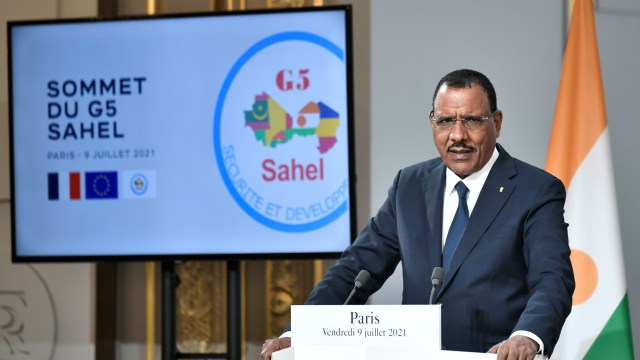Hello everyone. Today at WPR, we’ve got stories on Netflix’s “The Diplomat” and how the Wagner mutiny will affect the war in Ukraine.
Read all of our latest coverage here.
Now, here’s our take on today’s top stories:
Sweden-Turkey: Two men tore pages out of the Quran and burned them in front of a crowd outside a mosque in Stockholm on Wednesday, during the important Muslim holiday of Eid al-Adha. The incident sparked outrage in many Muslim-majority countries, the New York Times reports.
Our Take: The incident, and the ongoing backlash to it, will almost certainly create a continuing diplomatic headache for Sweden. Officials from several Muslim-majority countries condemned the act and have taken diplomatic measures against Sweden. Most notably, Turkish President Recep Tayyip Erdogan, who has been holding Sweden’s NATO bid hostage for over a year, used a similar incident in January as a reason for further delay and will likely do the same thing again.
At the heart of the issue, though, is Western countries’ commitment to free speech, which has been and will remain a wild card irritant in relations with countries that prioritize different values. France ran into the same issue in the 2010s because of cartoons in the satirical magazine Charlie Hebdo, with tragic results. Though the context and environment are different today, Sweden is facing a similar problem now.
*****
You can read the rest of today’s News Wire, a curated selection of one must-read article from every region, here.

Netflix’s popular new political drama “The Diplomat” is clearly designed to be more entertaining than educational. And yet, the show also makes the very specific choice to place its characters in a fictional world where the dynamics of international politics mirror, for the most part, the dynamics of the real world.
As I write in a briefing, that can be a problem for a series that has neither the capacity nor the narrative needed for nuanced explanations of these issues.

Netflix’s ‘The Diplomat’ Educates as It Entertains. That’s a Problem
In modeling the foreign policy dynamics depicted in “The Diplomat” on the dynamics of the real world, the popular new Netflix political drama inadvertently ends up doing as much educating as entertaining. That can be a problem for a series that has neither the capacity nor the narrative needed for nuanced explanations of these issues. Read more.
Meanwhile, the Wagner mutiny last weekend has raised hopes among observers that the chaos in Russia might hasten the end of the war in Ukraine.
But as columnist Paul Poast writes, it is just as likely, perhaps more so, that the mutiny created conditions that could actually prolong the war.
The Wagner Mutiny Will Probably Prolong the War in Ukraine
While we are still learning the details of last weekend’s mutiny by Yevgeny Prigozhin’s Wagner Group, there is understandable hope that the chaos in Russia might hasten the end of the war in Ukraine. But it is just as likely, perhaps more so, that the Wagner mutiny created conditions that could actually prolong the war. Read more.

We want to hear your take on the issues we cover.
This week’s question: In a column last week, Paul Poast argued that despite how influential Big Tech companies and their billionaire CEOs have become, they won’t ever rival or supplant sovereign nations in international politics. What’s your take?
Just reply to this email to give us your thoughts, along with your name and where you’re based. We’ll include the best ones we receive in an upcoming Daily Review. Those selected will also receive a free month of WPR.

The U.N. Security Council is set to vote today to end a decade-long peacekeeping mission in Mali. Two weeks ago, the country’s military junta abruptly asked for the mission’s 13,000 peacekeepers, who have been tasked with protecting civilians against an Islamist insurgency in Mali, to leave “without delay.”
The move comes after French troops withdrew from Mali last November following a similar request, raising questions about the future of the region’s fight against violent Islamist extremists. Mamadou Bodian wrote yesterday about the state of the security crisis:

The ‘Pivot’ to Niger Is No Magic Bullet for France’s Sahel Strategy
June 29, 2023 | The conflict against violent jihadist groups in the Sahel has only gotten worse amid a lack of trust between Mali, France and Niger. Read more.
*****
Ukrainian forces appear to be scattering a type of landmine that has been internationally banned in Russian-occupied areas, according to evidence collected by Human Rights Watch.
Charli Carpenter wrote in February that it’s important for Ukraine’s allies, as well as human rights organizations and media, to ensure that Kyiv maintains its moral high-ground by adhering to international law.
The West Can Help Ukraine Keep the Moral High Ground on Human Rights
Ukraine’s allies can help ensure Kyiv avoids committing human rights abuses in resisting Russia’s illegal war. Read more.
That’s all for today’s Daily Review. Coming up, we’ve got stories on the recent ADF attack in Uganda and on Egypt’s efforts to thaw relations with Iran.
Have a great day,
Jakob Cansler
More From WPR
- Frida Ghitis on upcoming primary elections in Mexico.
- Alexander Clarkson on the Wagner mutiny.
- Aaron Allen on Germany’s first-ever National Security Strategy.
- Erin Cook on the legacy Jokowi will leave in Indonesia.

